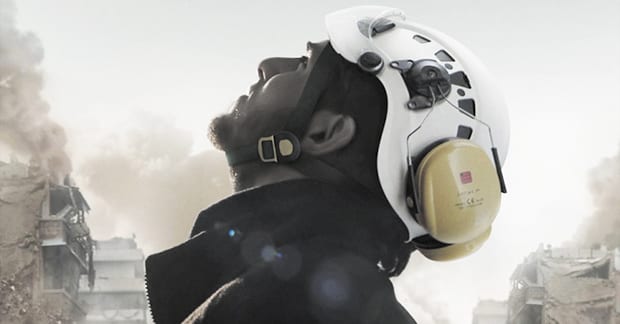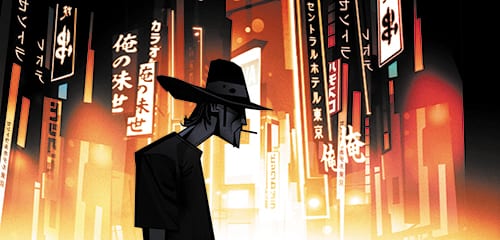The Oscar-nominated short films are ripe with political importance; also, how ‘The Salesman’ might be this year’s martyred frontrunner

RACING AHEAD | ‘White Helmets,’ above, are the favorites in the live action.
This year’s Academy Awards season is a jumble for prognosticating, in no small part because cultural issues like #OscarsSoWhite, the travel ban and other horrors of the Trump presidency give the academy a chance to take political stands with their artistic choices, i.e., Oscar votes … and popularity does count here. So, former frontrunners — or even current favorites — could fall sway to the desire to make A Statement.
And nowhere is that more apparent than in the shorts and foreign language film categories.
The Oscar Nominated Short Films Festival returns to the Magnolia Theatre once again, and this time the live action shorts are ripe with symbolism … not the least of which is that all are from overseas.
That’s especially the theme of Silent Nights, a Danish film about an undocumented immigrant in Copenhagen, trying to provide for his family back in Ghana. He falls for a Danish woman — a volunteer at the homeless shelter where he lives — and they begin a secret romance. The lovely film touches on issues of racial prejudice and violence against immigrants, though its focus is human connection.

Ennemis Interieurs
Another form of human connection with an anti-immigration theme is tensely presented in Ennemis Interieurs (Enemies Within), for my money the frontrunner in the category. In a drab government building somewhere in France, an interrogator questions an applicant for French citizenship. Initially, the inquiries are of the typical civics-lesson type — national motto, system of government — but they quickly turn more political.
The applicant, a Muslim born in Algeria when it was a French protectorate, but a life-long resident of France, is seeking to formalize his rights. Is he religious? the interrogator asks. Does he attend a mosque? Which one? What are the names of other attendees? Have they ever talked about politics? Why are these questions making him nervous? The process devolves into an Orwellian (even Kafka-esque) nightmare of accusations without evidence, suspicion without basis, fear without honor. How far is a country willing to go — how far to bend its own values — in the name of national security? There are no facile answers, just a feeling of dread and the inevitable degradation of society, if not through terrorism, then through the undermining of our humanity.

Pear Cider and Cigarettes
The other shorts, while less political, are equally good: Timecode, a charming near-silent romance between two security guards who have different shifts and pass in the night; Sing, a compelling drama about a teacher who will stop at nothing to win a choir competition; and La Femme et la TVG (The Lady and the Train), about an ageing widow (Jane Birkin) and her correspondence with the engineer of the high-speed train that whizzes by her house every day.
The animated shorts include several non-nominees for the Oscar, as well as four brief (under 10-minute) entries and an impressive 35-minute animated documentary, Pear Cider and Cigarettes, where a man recall the flamboyant friend who lived life on the edge. It’s the clear favorite.
Not screening this year are the documentary short films, though if you get a chance to see them, take it. In fact, the two best are available on Netflix. Extremis is a shattering portrait of a doctor who counsels families having to make end-of-life care decisions for their loved ones — is being kept alive on a respirator “life” at all?
You’ll weep. The other, The White Helmets, has the inside track for the Oscar, though. It follows a brigade of Syrian men in the war-ravaged city of Aleppo who volunteer to rescue their fellow countrymen trapped in the rubble following bombing raids by Russia and their own president. It brings the savagery of Syria’s situation home … and makes an astonishing statement about refugees.
White Helmets isn’t the only political film, though — nor the only one to touch on the Syrian crisis. Watani: My Homeland follows an Aleppo family that actually immigrates to Germany in search of safety. 4.1 Miles shows the impact of Afghani refugees crossing the narrow strait from Turkey to the Island of Lesbos in Greece, seeking safety.
Also opening this week at the Angelika is a film whose chances at a win could increase because of politics specifically. Asghar Farhadi’s The Salesman tells the story of a married couple who work as actors in a community theater production of Arthur Miller’s Death of a Salesman in Iran. One night, when the wife is home alone, an intruder breaks in and assaults her (we’re never sure just how), which sets the husband off on a vendetta to track down the man to restore his wife’s honor … and perhaps his own.
There are a lot of issues at play here — it reminded me in many respects of the American film In the Bedroom — but I wouldn’t put it in the top echelon of foreign language film contenders had not Farhadi been denied a visa to attend the Oscar ceremonies due to the Muslim travel ban. (He now refuses to travel to the U.S. on principle.) His style is flat, even un-dramatic; the wife’s behavior, while perhaps realistically unpredictable, doesn’t create a narrative thrust. Despite moments of power, it feels overly tempered and inward — so culturally specific, that it is perhaps unfathomable.
The Salesman now playing at the Angelika; Shorts Festival now playing at the Magnolia Theatre; some documentary shorts now streaming on Netflix.
This article appeared in the Dallas Voice print edition February, 10 2017.
